

Long-term Device Outcomes of Mesh Implants in Pelvic Organ P... : Obstetrics & Gynecology. In the past two decades, more than 2 million women have been implanted with transvaginal mesh in the United States for both stress urinary incontinence and pelvic organ prolapse (POP).1 Transvaginal mesh devices were widely adopted to address the high failure rates of traditional POP repairs.2 However, on April 16, 2019, the U.S.
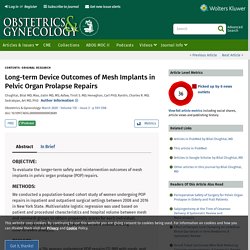
Food and Drug Administration (FDA) ordered all mesh manufacturers to stop selling and distributing their products for transvaginal repair of anterior prolapse.3 Thousands of complications have been reported to the FDA and more than 73,000 federal lawsuits have been filed against manufacturers of transvaginal mesh products.4,5 Despite a 20-year journey from device approval to global adoption, there was no “reasonable assurance of safety and effectiveness for these devices.”3 There is evidence that mesh reduced some risks of surgical failure, but also led to unique complications such as mesh exposures or erosion into neighboring organs. 1.
Kaplan S, Goldstein M. RANZCOG - Statement on pelvic mesh class action. 21 November 2019.
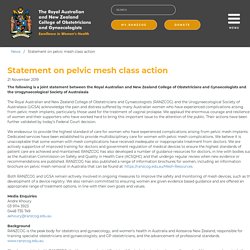
Vaginal Mesh Complications. A “period of high vigilance restriction” regarding vaginal mesh surgery has now been announced by the Cumberlege review (see table in the dropdown above ("Information on the safety of mesh surgery"), mirrored on the UK Parliament website, with effect from 10 July 2018.
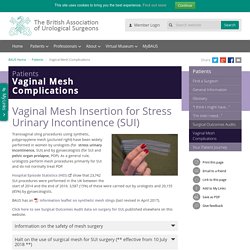
BAUS welcomes any recommendations that will help establish the nature and extent of complications suffered by women undergoing these types of surgery. Furthermore, we are keen to support the implementation of processes that will ensure existing patients with complications from mesh surgery are given the opportunity to be managed in centres with the required levels of experience, expertise and resources: click below to access information on this website about these centres. Characterization of the T-cell response to polypropylene mesh in women with complications - American Journal of Obstetrics & Gynecology.
What Impacts the All Cause Risk of Reoperation after Pelvic Organ Prolapse Repair? A Comparison of Mesh and Native Tissue Approaches in 110,329 Women - The Journal of Urology. Visit JU100.org to learn more about our rich 100-year history!
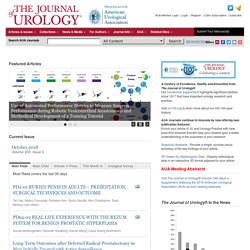
AUA Journals continue to innovate by now offering new publication features! Surgical Management of Female Stress Urinary Incontinence: 22-Year Population-Level Trends - Christopher Wallis. Announcement: Contribute to EU policy on the safety of meshes. The EAU is taking a bigger role in keeping urological topics on the public agenda.
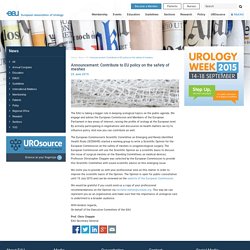
We engage and advise the European Commission and Members of the European Parliament in key areas of interest, raising the profile of urology at the European level. By actively participating in negotiations and discussion on health matters we try to influence policy. And now you can contribute as well. The European Commission’s Scientific Committee on Emerging and Newly Identified Health Risks (SCENIHR) started a working group to write a Scientific Opinion for the European Commission on the safety of meshes in urogynecological surgery. The European Commission will use the Scientific Opinion as a scientific basis to discuss the issue of surgical meshes at the Standing Committees on medical devices. The_perils_of_commercially_driven_surgical_innovation. Articles related to 28413126 - PubMed - NCBI. 2018 IUGA Annual Meeting. RCOG statement in response to NHS mesh review.
Consensus Statement of the European Urology Association and the European Urogynaecological Association on the Use of Implanted Materials for Treating... Europeanurology. RANZCOG WEBSITE - Pelvic Mesh Information. EAU, EUGA issue consensus statement on implant use in treating POP and SUI. 2017 Urological Challenges. ICS NEWS: What is the “prospect” of primary anterior and posterior prolapse surgery? ACOG Guidelines: Urinary Incontinence in Women. ACOG Guidelines: Urinary Incontinence in Women. Behavior and lifestyle modifications The ACOG guideline emphasizes the importance of behavioral and lifestyle modifications including bladder training, weight loss, and dietary management.
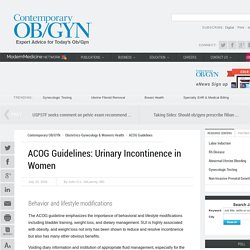
SUI is highly associated with obesity, and weight loss not only has been shown to reduce and resolve incontinence but also has many other obvious benefits. Voiding diary information and institution of appropriate fluid management, especially for the many women who drink excessive amounts of fluid, may resolve complaints in some cases. For example, a woman who takes her Lasix and then gets into her car for an hour-long commute to work only to leak trying to get to the bathroom can be told to take her diuretic at a different time. The time-honored practice of pelvic muscle exercises is also discussed, and giving appropriate instructions, particularly about when to use muscle contraction to prevent urine leakage, can make a substantial difference for many women. Medications Surgical management Reference 1. Preliminary_program_final. Blogs : Midurethral Slings: A Treatment Worth Protecting. Dear AUGS Members, The FDA had readied us for issues with vaginal mesh in their 2008 and 2011 Safety Statements.

However, what we didn’t anticipate was how unpredictable juries would respond to trials involving sling law suits. In the face of overwhelming evidence supporting the most studied procedure in the history of incontinence treatments, polypropylene midurethral slings now find themselves caught in the crosshairs of our legal system. The recent settlements doled out have caused companies producing slings to take a hard business look at whether the bad publicity and large sums of money involved with these cases are worth their time, investment, and energy. As we are all now aware, ASTORA (formerly AMS) has answered this question for themselves with their announcement in the Wall Street Journal earlier this week. AUGS has been in contact with other industry partners who assure us, they are not going to abandon the sling market.
Sincerely, Douglass Hale, MD AUGS President. The mess with the mesh - EAU16 Munich. “For the first time, we are establishing some firm rules for mesh use, which can only be a good thing for the safety of patients.”

Do we still need meshes for correction of pelvic organ prolapse? - EAU16 Munich. Pelvic organ prolapse (POP) is an increasingly common female health problem which, when symptomatic, has a significant negative impact on all aspects of daily life.

Treatment is commonly surgical and should aim not only at restoring anatomy but also at alleviating symptoms, improving long-term pelvic organ function. Semaine de la continence 2016. 11-15 March 2016. UGSA_2016_ASM_Program_Final. Annual Meeting. DocumentsDownload. OASIS. OASIS. OASIS. OASIS. OASIS. Syllabus26_6b.